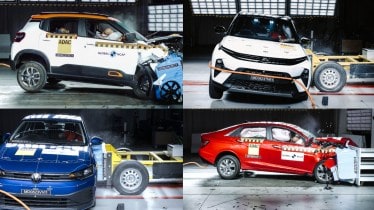It was on March 21, Global NCAP, a global road safety watchdog released the latest results of its crash test. The made-in-India Citroen e-C3 scored Zero stars for adult occupant rating and one star for child occupant safety. This reignited a long-standing issue? Are car makers compromising on quality and safety while manufacturing for Indian customers?
Alejandro Furas, Secretary General, Global NCAP stated, “It is alarming that an automaker like PSA is selling a model with such a low safety level in markets like India while they would not even consider offering such a car in Europe for example.”
“It is worth keeping in mind that PSA/Stellantis are also performing badly on safety in emerging markets like Latin America.”
This is particularly relevant given the fact that road accidents continue to be a major factor leading to significant loss of lives in India. As per the latest data available from the Ministry of Road Transport & Highways, there were 151,997 road accidents in 2022 that claimed 61,038 lives. This translates to 17 accidents every hour and essentially means 7 lives lost every hour.
This further reiterates the need for safety for Indian consumers. “No respondent would ever tell you that he/she would go ahead and buy an unsafe vehicle. one may raise the issue of how much one can spend for the same. Here again, the younger generation and people in metros will go the extra mile to ensure they buy a safe vehicle. The others question as to why safety should cost so much more, which is a valid question,” said Avik Chattopadhyay, an automobile industry veteran and Co-Founder of brand strategy consultancy Expereal.
K K Gandhi, Auto and Fuel expert, e-mobility, strategic planning and convener, Centre for Auto Policy and Research added, “Automakers are manufacturing vehicles meeting the mandated notified safety standards. The government of India over a period of time has been notifying additional safety requirements such as airbags for drivers and co-passengers, seat belts, now with alarm if not worn, and frontal crash and rear crashes among others. Therefore, the minimum safety is ensured today.”
Safety ratings as marketing tools
Gandhi also pointed out how the 5-star Global NCAP and Bharat NCAP safety ratings are being used as marketing tools as car owners “start giving higher weightage to higher stars and would be willing to pay more money for the same.” This he says would enable the consumer to make an informed decision while deciding to buy a particular brand and model.
Chattopadhyay explained the current industry dynamics and how “automakers, safety is a subject everyone talks about but then conveniently looks at the regulatory authorities when it comes to applicable standards and compliance. The Volkswagen Polo getting zero stars in 2013 was the first shock. The Citroen e-C3 one is another one. In the meantime, brands like Tata Motors and Mahindra & Mahindra, as part of their image makeover, realised that safety is a platform they should adopt along with design. This was to counter Maruti Suzuki India and Hyundai Motor India who based their leadership on fuel economy, serviceability and features. This strategy has worked very well for them as they also spent considerable marketing money behind their terrific Global NCAP results.”
While many industry stakeholders have criticised and questioned the Global NCAP’s bias, one cannot deny they made vehicle safety awareness a factor to pay attention to in India. Furas pointed out, “It’s important for regulatory push and consumer pull to co-exist in the improvement of vehicle safety. One sets a baseline level of performance and the other catalyses improvement beyond a minimum requirement. Five-star performance (NCAP rating) usually exceeds regulatory requirements by a significant difference.”
Volume and economies of scale
Automakers often argue that incorporating additional safety features, which go beyond the local regulations, would mean increased costs for consumers.
Chattopadhyay raised concerns about “Senior leaders of the industry citing this as a business reason is a very disturbing sign. To say that safety should be an option is like saying law and order should be an option in a democracy. My counter to them is that if all the automakers decided to incorporate safety features, given that close to 4 million passenger vehicles and 20 million two-wheelers are sold every year, the cost would come down drastically.”
Bharat NCAP
It was exactly 10-years ago Global NCAP’s #SaferCarsForIndia program crash tested five popular car models in India – Maruti Suzuki Alto (0-star); Tata Nano (0-star); Hyundai i10 (0-star); Volkswagen Polo (0-star) and Ford Figo (0-star).
The program has tested 49 vehicles till now, and is expected to test few more vehicles before Bharat NCAP program kicks-in at the end of the year.However, the Bharat NCAP model will also be voluntary and assessment is not a compulsion for automakers.
According to Chattopadhyay, “Hopefully the media, consumer activism and social media will play the role of the conscience keeper here and badger those automakers who stay away from testing each offering and variant under the NCAP. Nothing else will work in favour of the consumer.”
But all is not lost, Furas has revealed that, “Before Our Safer Cars for India campaign concludes and Bharat NCAP’s testing comes on stream, we have several tests to publish over the coming months during this period of transition. After that we are planning a new initiative which will be relevant to a number of emerging vehicle markets including India.”
It’s perhaps a wait and watch game at the moment. The question is would vehicle safety translate to more than just a matter of compliance and good marketing for manufacturers in India? The hope is that greater awareness, consumer demand and economies of scale will kick in and compel car makers to adopt safety as a necessity.
